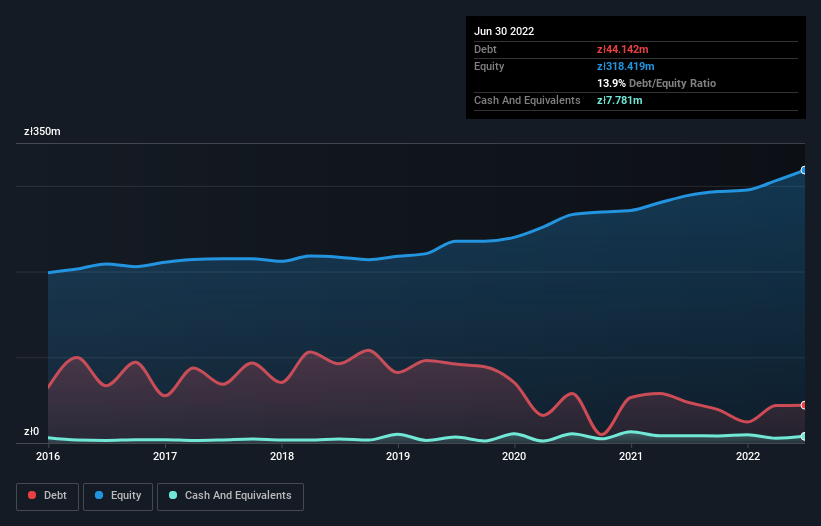
David Iben put it well when he said, 'Volatility is not a risk we care about. What we care about is avoiding the permanent loss of capital.' It's only natural to consider a company's balance sheet when you examine how risky it is, since debt is often involved when a business collapses. We note that Lubawa S.A. (WSE:LBW) does have debt on its balance sheet. But should shareholders be worried about its use of debt?
When Is Debt A Problem?
Generally speaking, debt only becomes a real problem when a company can't easily pay it off, either by raising capital or with its own cash flow. In the worst case scenario, a company can go bankrupt if it cannot pay its creditors. However, a more frequent (but still costly) occurrence is where a company must issue shares at bargain-basement prices, permanently diluting shareholders, just to shore up its balance sheet. Of course, plenty of companies use debt to fund growth, without any negative consequences. When we think about a company's use of debt, we first look at cash and debt together.
Check out the opportunities and risks within the XX Aerospace & Defense industry.
How Much Debt Does Lubawa Carry?
You can click the graphic below for the historical numbers, but it shows that Lubawa had zł44.1m of debt in June 2022, down from zł47.2m, one year before. However, it does have zł7.78m in cash offsetting this, leading to net debt of about zł36.4m.

How Strong Is Lubawa's Balance Sheet?
Zooming in on the latest balance sheet data, we can see that Lubawa had liabilities of zł90.5m due within 12 months and liabilities of zł40.0m due beyond that. Offsetting these obligations, it had cash of zł7.78m as well as receivables valued at zł116.6m due within 12 months. So its liabilities outweigh the sum of its cash and (near-term) receivables by zł6.09m.
This state of affairs indicates that Lubawa's balance sheet looks quite solid, as its total liabilities are just about equal to its liquid assets. So it's very unlikely that the zł383.2m company is short on cash, but still worth keeping an eye on the balance sheet.
We use two main ratios to inform us about debt levels relative to earnings. The first is net debt divided by earnings before interest, tax, depreciation, and amortization (EBITDA), while the second is how many times its earnings before interest and tax (EBIT) covers its interest expense (or its interest cover, for short). The advantage of this approach is that we take into account both the absolute quantum of debt (with net debt to EBITDA) and the actual interest expenses associated with that debt (with its interest cover ratio).
Lubawa's net debt is only 0.73 times its EBITDA. And its EBIT easily covers its interest expense, being 24.0 times the size. So we're pretty relaxed about its super-conservative use of debt. In addition to that, we're happy to report that Lubawa has boosted its EBIT by 38%, thus reducing the spectre of future debt repayments. There's no doubt that we learn most about debt from the balance sheet. But you can't view debt in total isolation; since Lubawa will need earnings to service that debt. So if you're keen to discover more about its earnings, it might be worth checking out this graph of its long term earnings trend.
Finally, while the tax-man may adore accounting profits, lenders only accept cold hard cash. So the logical step is to look at the proportion of that EBIT that is matched by actual free cash flow. Looking at the most recent three years, Lubawa recorded free cash flow of 33% of its EBIT, which is weaker than we'd expect. That weak cash conversion makes it more difficult to handle indebtedness.
Our View
Happily, Lubawa's impressive interest cover implies it has the upper hand on its debt. But truth be told we feel its conversion of EBIT to free cash flow does undermine this impression a bit. Zooming out, Lubawa seems to use debt quite reasonably; and that gets the nod from us. While debt does bring risk, when used wisely it can also bring a higher return on equity. When analysing debt levels, the balance sheet is the obvious place to start. But ultimately, every company can contain risks that exist outside of the balance sheet. For example, we've discovered 2 warning signs for Lubawa that you should be aware of before investing here.
Of course, if you're the type of investor who prefers buying stocks without the burden of debt, then don't hesitate to discover our exclusive list of net cash growth stocks, today.
New: AI Stock Screener & Alerts
Our new AI Stock Screener scans the market every day to uncover opportunities.
• Dividend Powerhouses (3%+ Yield)
• Undervalued Small Caps with Insider Buying
• High growth Tech and AI Companies
Or build your own from over 50 metrics.
Have feedback on this article? Concerned about the content? Get in touch with us directly. Alternatively, email editorial-team (at) simplywallst.com.
This article by Simply Wall St is general in nature. We provide commentary based on historical data and analyst forecasts only using an unbiased methodology and our articles are not intended to be financial advice. It does not constitute a recommendation to buy or sell any stock, and does not take account of your objectives, or your financial situation. We aim to bring you long-term focused analysis driven by fundamental data. Note that our analysis may not factor in the latest price-sensitive company announcements or qualitative material. Simply Wall St has no position in any stocks mentioned.
About WSE:LBW
Lubawa
Manufactures and sells army, police, municipal police, border patrol, fire brigade, and special force products in Poland and internationally.
Outstanding track record with flawless balance sheet.
Market Insights
Community Narratives


